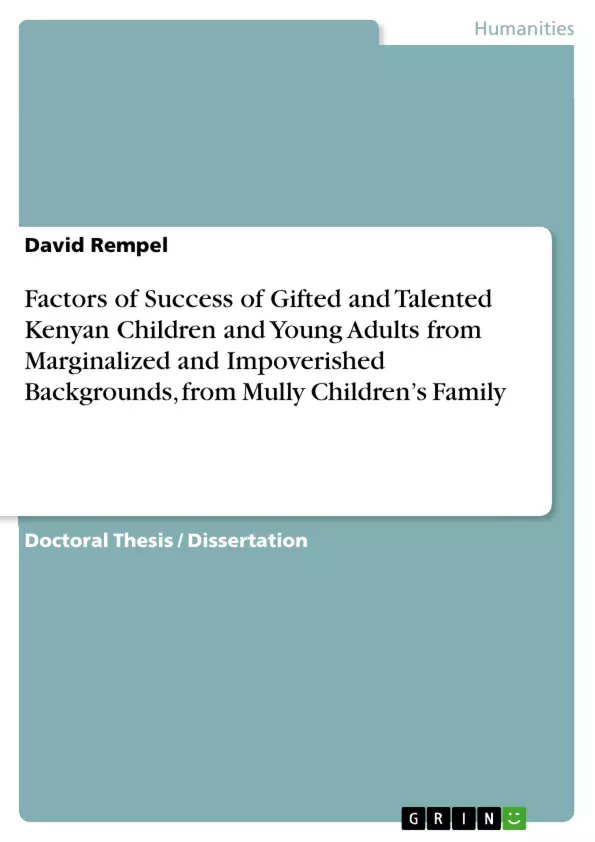This study analyzes the success factors of winning awards for individual beneficiaries and as an organization within Mully Children’s Family (MCF), a Kenyan NGO for marginalized and traumatized children. The Actiotope Model is used to help analyze, and define the success factors. The Educational Capital developed and the development of Learning Capital supported by MCF as a construct is analyzed through the use of: 1) a QELC questionnaire with beneficiaries, 2) interviews of beneficiaries 3) NBLC checklist-based questionnaires for people in the support system and 4) interviews of staff and community.
The Microsystems developed by the MCF construct, provide tools and well-developed Educational Capital as well as a system of coaching and nurturing to be able to enhance Learning Capital. The MCF construct is a Microsystem; it has its own compounds, schools, playgrounds and clubs, to ensure that the best Micro- and Mesosystem is created to rehabilitate and help beneficiaries effectively interact and impact the Exosystems around them, while some win awards. The success factors based on the QELC questionnaire for the award winners were determined.
The three strong correlations for award winners were: 1) Cultural Educational Capital, especially as it relates to their choice to surround themselves with other high achievers within the MCF construct; 2) Organismic Learning Capital which suggests that award winners not only understand the significance of keeping their bodies healthy but also practice this; 3. Modifiability Belief, the award winners understand they have the ability to modify their behavior, learn from their mistakes and success and then modify their present actions.
The impact of mentors was researched. Peers were found to play a vital role in success as well. The MCF construct intentionalizes staff-beneficiary and peer-peer mentoring. The success of MCF, which supports the modification of each beneficiary through the complex intentionalized Actiotope, is effective as can be seen by the rankings of their primary and secondary exam results and the numerous awards of individuals and teams; and also provides an environment in which marginalized members of Kenyan society have the chance to develop themselves to win awards, become entrepreneurs, and become vital members of society.
Inhaltsverzeichnis (Table of Contents)
- Abstract
- List of Tables
- List of Figures
- Acknowledgements
- Deutsche Zusammenfassung
- 1.0 Introduction
- 1.1. Purpose
- 1.2. Goals
- 1.3. Significance
- 1.4. Research Questions
- 1.5. Overview of the Study
- 2.0 Literature Review
- 2.1. Untapped Potential in Marginalized Children and Youth
- 2.2. Role of the Environment
- 2.3. Performance and System Theories
- 2.4. Societal Impact and Responsibility
- 2.5. Creating a conducive Microsystem to create a condusive Mesosystem
- 2.6. Systems and Programs to Promote High Achievers
- 2.7. Impact and Development of Personalized Goals
- 2.8. Relationship between Goals and Role Models or Mentors
- 2.9. Differentiated Model of Giftedness and Talent as it relates to MCF
- 2.10. Social Interdependency of Each Individual within the Larger Construct
- 2.11. Learning Process
- 2.12. Regulation types
- 2.13. Resources
Zielsetzung und Themenschwerpunkte (Objectives and Key Themes)
This study investigates the success factors of award-winning beneficiaries within Mully Children's Family (MCF), a Kenyan NGO dedicated to supporting marginalized and traumatized children. The research utilizes the Actiotope Model to analyze and define these success factors, focusing on the development of Educational Capital and Learning Capital within the MCF construct.
- Identifying key success factors contributing to the achievements of award-winning beneficiaries within MCF.
- Examining the role of Educational Capital and Learning Capital in the development and success of beneficiaries.
- Analyzing the impact of the MCF construct's microsystems and their influence on the success of beneficiaries.
- Exploring the significance of mentoring and peer support in facilitating the development of beneficiaries.
- Evaluating the effectiveness of the MCF construct in fostering a conducive environment for the success of marginalized members of Kenyan society.
Zusammenfassung der Kapitel (Chapter Summaries)
The introduction lays out the purpose, goals, significance, research questions, and an overview of the study, which examines the success factors of award-winning beneficiaries within Mully Children's Family (MCF). The literature review explores various concepts related to the study's focus, including untapped potential in marginalized children and youth, the role of the environment, performance and system theories, societal impact and responsibility, creating conducive microsystems, programs for high achievers, personalized goals, goals and mentors, differentiated models of giftedness and talent, social interdependency, the learning process, regulation types, and resources.
Schlüsselwörter (Keywords)
This study focuses on the success factors of award-winning beneficiaries from marginalized and impoverished backgrounds within Mully Children's Family (MCF) in Kenya. Key concepts explored include the Actiotope Model, Educational Capital, Learning Capital, microsystems, mesosystems, exosystems, mentoring, peer support, and the development of marginalized individuals within the larger construct.
Frequently Asked Questions
What is Mully Children’s Family (MCF)?
MCF is a Kenyan NGO that supports marginalized and traumatized children through rehabilitation, education, and development programs.
What is the Actiotope Model used for in this study?
The Actiotope Model is used to analyze and define success factors by focusing on the development of Educational and Learning Capital within the children's environment.
What are the key success factors identified for award winners?
The study identified three main factors: Cultural Educational Capital (high-achieving peers), Organismic Learning Capital (physical health), and Modifiability Belief (ability to learn from mistakes).
How important are mentors and peers at MCF?
They are vital; MCF intentionally fosters staff-beneficiary and peer-to-peer mentoring to enhance the learning process and social interdependency.
How effective is the MCF construct for marginalized youth?
It is highly effective, as evidenced by top rankings in primary and secondary exams and numerous awards won by beneficiaries who become entrepreneurs and vital society members.
- Citation du texte
- David Rempel (Auteur), 2017, Factors of Success of Gifted and Talented Kenyan Children and Young Adults from Marginalized and Impoverished Backgrounds, from Mully Children’s Family, Munich, GRIN Verlag, https://www.grin.com/document/371685



